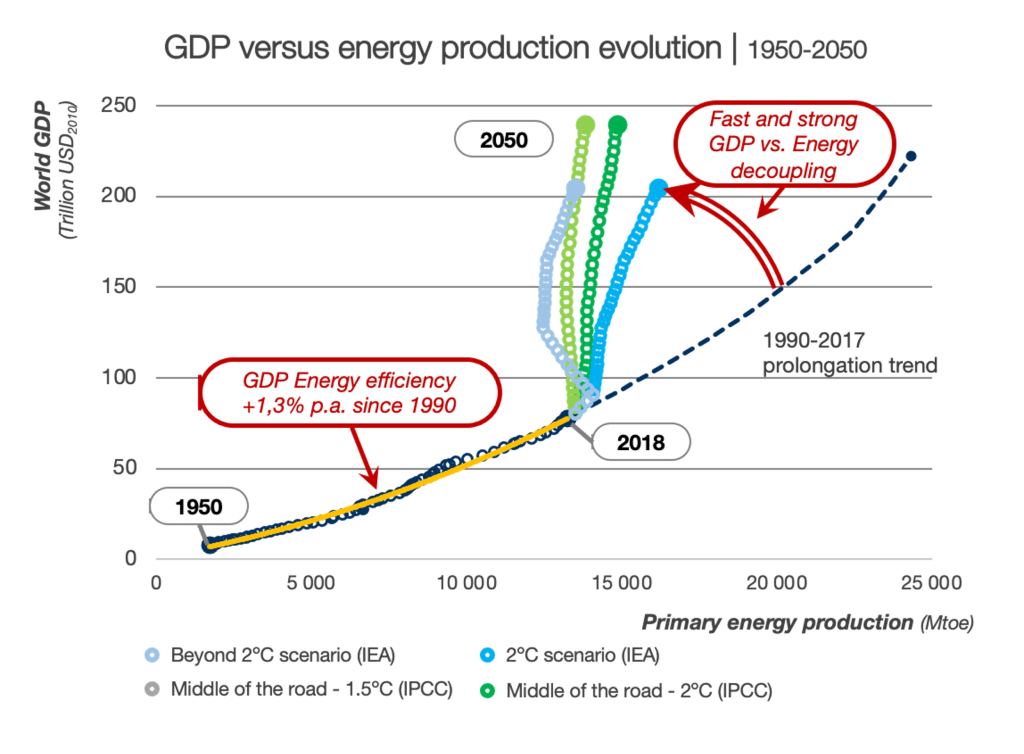IRIS initiative: connecting business strategy and planetary boundaries
Press release
To address coming business disruptions induced by both low carbon and climate change challenges, major European companies join forces with Carbone 4 and its partners to design new strategic foresight tools. Critical decisions will be made in an unstable and disruptive business environment
Both the low-carbon transition and adaptation to climate change are unavoidable challenges to face in the long run. These challenges will arise in a chaotic and uncertain way, and will disrupt both companies’ operations and markets. The president of the French association of large companies, M. Burelle, thus stressed in November 2019 that “companies must build their future by integrating a robust energy-climate foresight analysis in their strategy to better anticipate the potential disruptions on their business environment". This observation, is also outlined by TCFD and has since been widely spread.
Considering a diversified panel of possible futures consistent with physical boundaries
The IRIS initiative addresses to both companies and their stakeholders. Its purpose is to design a new generation of tools and methods to support corporate strategic thinking evolution:
- Systemic and sectorized "framework" scenarios, suited to the companies’ needs, that will explore different climatic (<2°C and >2°C), technological and sociological pathways. They will also describe the possible transformations along the value chains in coherence with the planetary boundaries (resources availability, environment feedback loop, etc.) and that are now well documented;
- A guidance through the understanding and use of scenarios for strategic thinking via a dedicated skills upgrade platform : “the Scenarios lab”.
The time has come for a paradigm shift: transform strategic thinking to build resilient paths for companies
To seize opportunities, manage risks related to this new context and, most importantly, build confidence both within and outside the company, traditional approaches are no longer appropriate. Indeed, they often prove to be focused on short-term and over compartmentalized, carrying results often disconnected to current realities. The strategic thinking of economic players will only be effective (e.g. to prevent investments in potentially stranded assets) only if it includes long term issues, in a global and systemic approach that consider the physical grounds of their businesses.
Systemic approach, consistency with physics laws and relevant data: a basis for a new generation of scenarios dedicated to economic players
Current reference scenarios, initially designed to meet other needs (e.g. public policies assessment or academic researches), present several gaps that reduce their relevance, especially for companies. Beyond the data issue (availability and use), these scenarios often describe transformations whose physical coherence is questionable and do not include a detailed “narratives” which grant meaning to the underlying assumptions. Transformation scenarios must be diversified and shall include the description of the companies’ underlying business activities, as well as ensure their "physical" feasibility, and their overall consistency.

Regardless of the issuer, almost all current scenarios rely on a decoupling of GDP and energy, while it has never been observed to such an extent. Relying on such scenarios leads to an incomplete understanding of business impacts of low carbon transition by companies
Companies take the lead to think with courage and lucidity about the coming deep transformations of our economy
Several large companies have already joined the IRIS Initiative ; the project team expects to complete the panel in the coming weeks. Such a mobilization of companies will enable us to build a common and opposable framework for reflection in order to rationally and courageously assess the transformations of our society and economy. For any company, it is a matter of sustainability and prosperity. The IRIS initiative is thus an indispensable complement to the normative approaches of "alignment" on a 2°C (or less) pathways. Designed with transparency, all of the IRIS initiative’s deliverables will be freely accessible. The IRIS Initiative partners will join efforts to ensure a wide diffusion and to raise enthusiasm and contributions from both economic and academic players. The target is clear: enable all organizations to embrace and use both tools and methods to reshape their strategy and meet the energy and climate challenges. The project is scheduled to begin early 2021. The first deliverables (scenario narratives, modeling tools, data sets) will be issued in one year later.
Leading international institutions are partners alongside Carbone 4 to take up the challenges of reaching a top academic excellence level while making scenarios easy to read and use by companies
Prestigious institutions have joined forces with Carbone 4 to carry out the work and share their expertise in key areas (modelling; economy and society; corporate strategy and training; environment systems: energy, resources, climate, land use and biodiversity):
- A leading American university
- An European development bank
- A leading European business schools
- Several leading laboratories from European universities
This dream team of partners plus the circle of involved companies will enable to build a bridge between academic excellence and the concrete expectations of the economic players.
Contact us
Contact us about any question you have about Carbone 4, or for a request for specific assistance.



